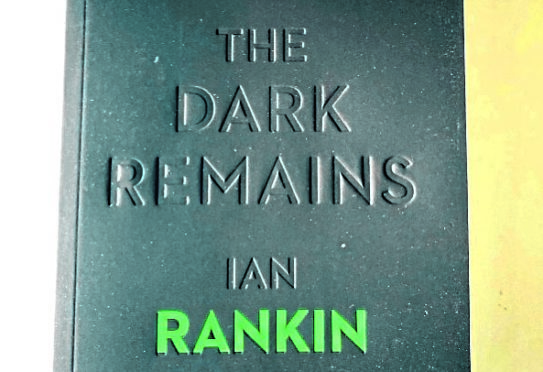
I heard the letterbox open then a thump as something with heft hit the floor, a black padded envelope. Opening it, I found a pre-publication paperback, bound in black with two names in neon green. McIlvanney and Rankin.
There had been rumours last year, then in December the announcement and now here, in my hands, was the book. If there is such a thing as the Holy Grail of Tartan Noir, then here it was. This new Laidlaw book, The Dark Remains, completed by Ian Rankin from notes left by William McIlvanney, will be published in September.
Everyone knows Rankin, he’s the most successful Scottish novelist of his generation. Not quite so famous, perhaps, but equally influential is the late McIllvaney. Ask any Scottish crime writer for their biggest influence and inspiration and chances are they will reply McIlvanney and his detective novels featuring tortured Jack Laidlaw.
Denise Mina is a fan: “Fastest, first and best, Laidlaw is the melancholy heir to Marlowe. Reads like a breathless scalpel cut through the bloody heart of a city”. As is Val MacDermid: “He kicked the door open so the likes of Ian Rankin, Denise Mina and me could sneak through behind him.” With recommendations like that it’s no wonder that The Dark Remains is tipped to be the crime novel of the year.
McIlvanney published Laidlaw back in 1977. Besides being the first book to feature Laidlaw, it kick-started the Tartan Noir genre that now fills bookshop shelves around the world. However, a more unlikely candidate for influencing a generation of crime writers would be hard to find. McIlvanney’s Laidlaw books explore the different lives that make up the city of Glasgow as much as they concentrate on a central crime to be solved. It’s Laidlaw the man that interested McIlvanney – and his fans. His job was just the excuse for his odyssey through our biggest city’s meanest streets.
It’s hard to imagine now but, at the time, the idea of a “literary” writer writing a police procedural set in Glasgow was quite the shock. The literary world divides books into “literary fiction” and “genre fiction” and never the two shall meet. McIlvanney’s Laidlaw series threw them into a pub’s backroom together and proved that a book about murder and crime in ’70s Glasgow was every bit as capable of illuminating the human experience as any Booker prize-winner.
Last year McIlvanney’s estate decided to do something about the notes he had left for another Laidlaw book. This would be a prequel to the others, an early case for Laidlaw. They were notes though, they needed an author to shape them into a complete book. Who better than Rankin?
He said yes but acknowledged it was going to be a tough gig for a few reasons. A man who writes about Edinburgh writing a book about Glasgow, two different styles, the weight of expectation, the pressure of not sullying such a distinguished legacy. He describes his approach to writing the book as “an act of ventriloquism.”
He wanted the book to read as if it was written by McIlvanney alone, seeing his role as a facilitator as much as a co-author. The trick, as he saw it was to disappear into the book, to be invisible.
I have to be careful of what I say about before its publication but I can say this much. Ian Rankin does not need to worry. Laidlaw is back walking the mean streets of Glasgow and he is just as troubled, as brilliant, and as iconic as he ever was.
Alan Park’s novel The April Dead was last week longlisted for the McIlvanney Prize, formerly the Scottish Crime Book of the Year

Enjoy the convenience of having The Sunday Post delivered as a digital ePaper straight to your smartphone, tablet or computer.
Subscribe for only £5.49 a month and enjoy all the benefits of the printed paper as a digital replica.
Subscribe